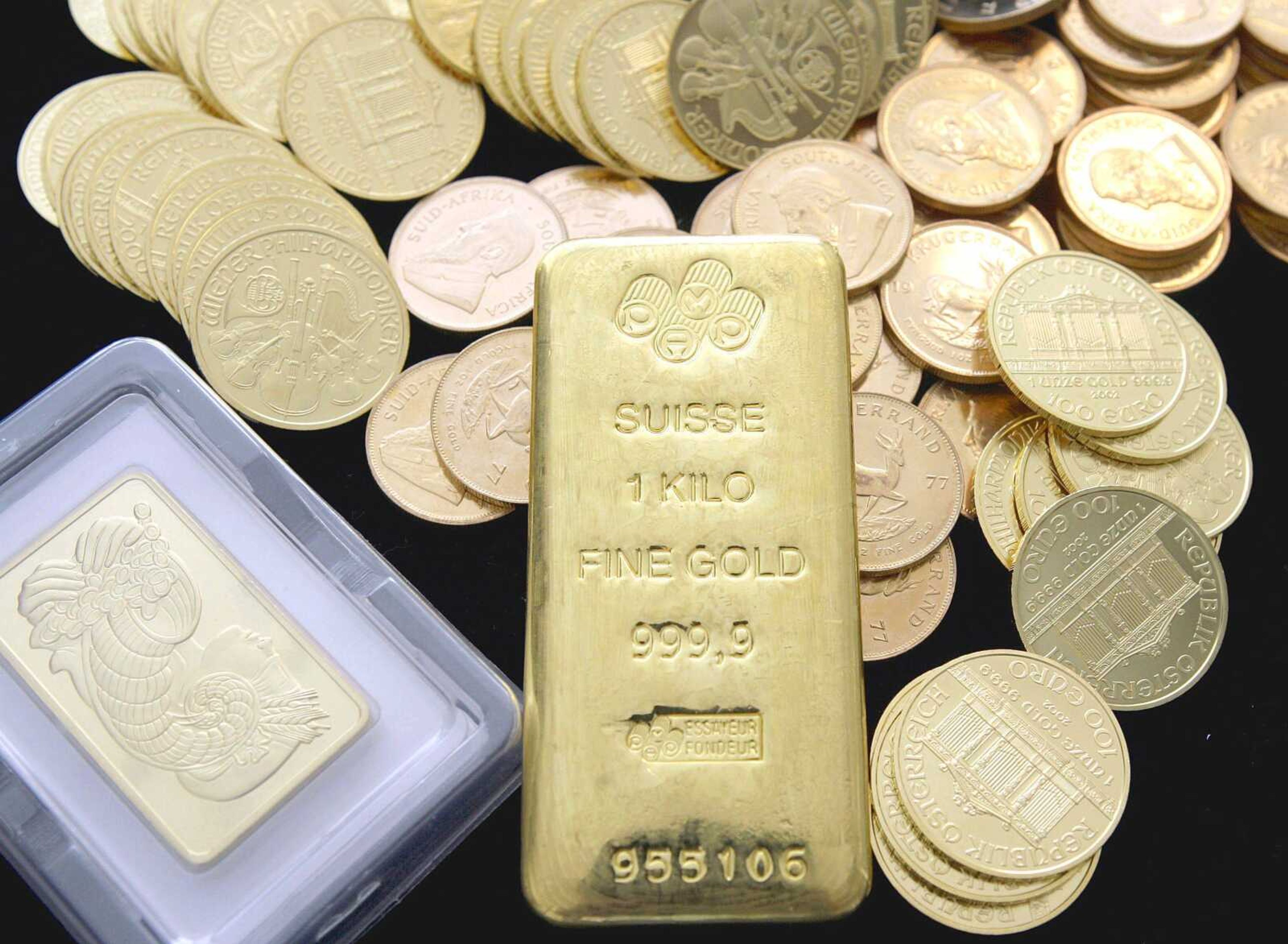Gold falls $58 to lowest level in 3 months
NEW YORK -- The price of gold, which has climbed for years like a blood pressure reading for anxious investors, plunged Wednesday to its lowest level in three months. Gold fell almost $58 to $1,614 per ounce. It has declined 15 percent since September, when it hit a peak of $1,907. It had more than doubled since the financial crisis three years earlier...
NEW YORK -- The price of gold, which has climbed for years like a blood pressure reading for anxious investors, plunged Wednesday to its lowest level in three months.
Gold fell almost $58 to $1,614 per ounce. It has declined 15 percent since September, when it hit a peak of $1,907. It had more than doubled since the financial crisis three years earlier.
Surprisingly, the fall came on an ugly day in the stock market -- the Dow Jones industrial average lost 125 points. Last year, a day like Wednesday would have caused fearful investors to buy gold as a protective investment.
"It's difficult to forecast, but I think the gold bull market is over," said Cetin Ciner, a professor of finance at the University of North Carolina-Wilmington. He likened the surge in gold to dot-com stocks before they collapsed.
Some investors buy gold as a hedge against inflation, and minutes from a Federal Reserve meeting that came out Tuesday afternoon suggested that the central bank believes inflation remains under control.
Gold's attraction as an asset of refuge during crises also seems to have diminished. The economy has picked up, and worst-case scenarios in the United States and Europe have faded.
"Fear has been gold's best friend, and so to the extent that fear is dissipating, gold should fall," said Jim Paulsen, chief investment strategist at Wells Capital Management. "We might look back at these Fed minutes as the line in the sand."
Gold has been hit in recent weeks by striking gold sellers in India, the world's largest buyer of physical gold, who are upset over government tariffs. Another bearish sign was a surge Wednesday in the dollar, which tends to rise when gold falls.
Gold fetched only $300 to $400 an ounce during the 1990s but climbed steadily last decade. By late 2008, it was near $900. It took off that fall when prices for stocks and corporate bonds plunged, wiping out years of savings. Even money market funds looked suspect. Investors bid up prices for the safest of assets, like U.S. Treasury bonds. Others turned to gold.
"During our bout with Armageddon, people ran to it for safety," said Abraham Bailin, a commodity analyst at Morningstar. "It might sound silly now, but that's where it started."
Demand for gold also surged as the Federal Reserve bought bonds, starting in the spring of 2009, to push down borrowing costs and stimulate the economy, a move known as quantitative easing.
The Fed's efforts to pump money into the banking system and avert a deep recession led to fears of runaway inflation, a concern shared by both the tea party and big-shot investors.
Buying gold soon became a political statement. For those who didn't trust financial institutions or were wary of the government, it was the investment of choice. Television personality Glenn Beck advised viewers to stock up on gold bars.
"Gold became a symbol of your political leanings," Bailin said. "It became a way to speculate on the solvency of the economy."
Or perhaps to speculate that the price would continue to rise, whatever the reason. Some analysts, like Ciner and Wells Fargo's Paulsen, said that as the price climbed ever higher, everyday investors may have been trying to catch the wave.
Gold was named the "best investment" in CNBC's quarterly survey of investors released last month, topping real estate and stocks by a wide margin. Nearly half of those surveyed considered it a bad time to buy stocks.
One popular vehicle for buying gold, the SPDR Gold Trust, a fund that trades on the open market like a stock, has attracted hundreds of millions of dollars of investor money each month since its launch in 2004.
It now holds $67.3 billion worth of gold. That makes it the largest ETF except for the SPDR S&P 500, which tracks stocks, according to Morningstar's Bailin.
Ciner noted that the price of gold dropped Wednesday despite news that Spain had to offer unexpectedly high interest rates to attract investors to buy new government bonds. That suggested that a solution to the European debt troubles is far from over -- normally a trigger for buying gold, not selling it.
"It's pretty obvious that gold's character has completely changed," Ciner said. "If it was a real safe-haven asset, you would have expected investors to flock to gold."
Bulls pointed out that gold's popularity reflects a widespread skepticism of the financial system and of national currencies -- and that investors are fools to feel confident about them.
John Manley, chief equity strategist for Wells Fargo Advantage Funds, said that gold's role as a sort of fourth currency to the three big ones -- the dollar, euro and yen -- is unlikely to diminish because of those currencies' troubles. Those include the U.S. debt, Japan's aging population and dissent among European countries about how to solve the debt problem there.
Nicholas Colas, chief market strategist at ConvergEx Group, said he thinks gold's popularity reflects the anxiety of our age. The price may change, he said, but an ounce of gold is always bound to be worth something. Old stock certificates, he said, may wind up worth no more than toilet paper.
"The gold rush isn't over," he said. "It's just on pause."
----
AP Business Writer Pallavi Gogoi contributed to this report.
Connect with the Southeast Missourian Newsroom:
For corrections to this story or other insights for the editor, click here. To submit a letter to the editor, click here. To learn about the Southeast Missourian’s AI Policy, click here.









